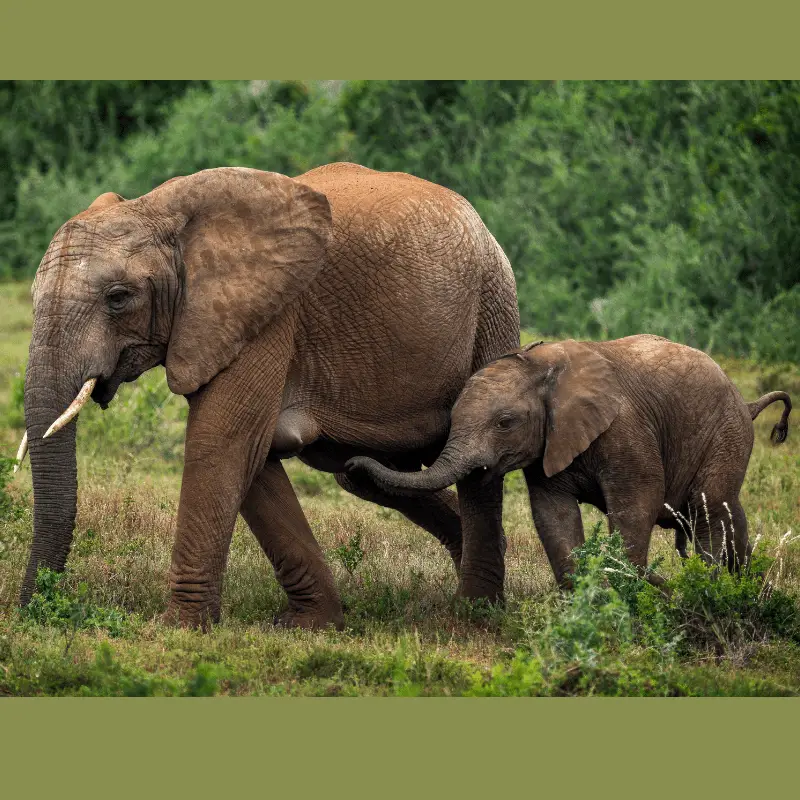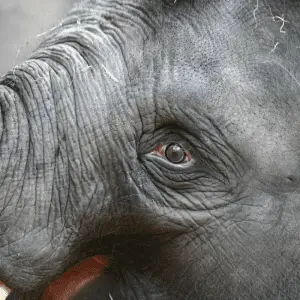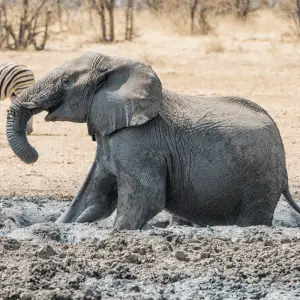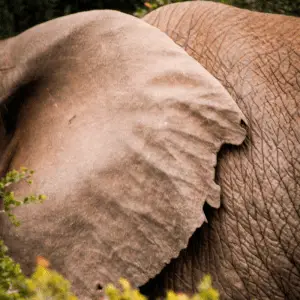An African elephant carries its baby for approximately 22 months. However, an Asian elephant is pregnant for around 18 months.
Elephants have the longest gestation period of any mammal. This is due to the elephant’s vast size and the time it takes for the brain to develop. The female elephant can give birth once every five years.
Overview
- Conservation: Endangered Species
- African elephant lifespan: 60 – 70 Years
- Asian elephant lifespan: 50 – 60 Years
- African elephant scientific name: Elephantidae
- Asian elephant’s scientific name: Elephas maximus
- African elephant Gestation Period: 22 months
- Asian elephant Gestation Period: 18 – 22 months
Unique Pregnancy of The Elephants
Usually, female elephants give birth to a single calf. On rare occasions, however, elephants can also give birth to twins. As we have mentioned earlier, female elephants can give birth to babies once every five years. Female elephants can get pregnant until they are about 50 years of age.
Labour of the Female Elephants
The labour pain of female elephants can last from several hours to several days. At the beginning of labour, female elephants tend to lose their mucus plugs. Once it happens, the contraction of the female elephants starts.
The gap between the contraction decreases as the labour continues. Generally, wild elephants give birth to babies at night. The researchers believe that the calm and quiet environment of the nighttime allows the elephants an undisturbed environment to bring their babies into the world.
Birth of the Calf
As the time of giving birth approaches, the female elephants communicate with the other female family members. The pregnant elephant unites with the female members to secure protection during labour.
In the Wild, sometimes the entire herd circles around the pregnant female while she gives birth. This behaviour offers the pregnant elephant protection from all sides. The birthing process lasts only for a few minutes.
During birth, the amniotic bladder of the elephants may come out even before the calf. That is what makes the foetus look like a balloon-like matter. Once the calf passes through the birth canal, the mother comes to the rescue and helps to separate the amniotic bladder away from the newborn baby.
Immediately after birth, the mother sniffs and blows on the calf before accepting it. Once the mother accepts her calf, she will pull it towards her and start protecting it, creating and forming a special bond forever.
Elephant Pregnancy Timeline
| Stage of Pregnancy | Duration |
|---|---|
| Gestation | 18-22 months |
| Pre-birth | 2-3 weeks |
| Labour | 6-12 hours |
| Post-birth | 1-2 days |
How much do baby elephants weigh when born?
At birth, the baby elephants weigh about 200 to 320 pounds.
Protecting The Young
The baby elephant stays with its mother until it reaches adulthood. During this time, the herd takes responsibility for the calf and protects it from predators or other dangers.
The calves are vulnerable even if predators like tigers and lions do not threaten adult elephants. That is why the herd encircles the baby and young elephants most of the time to protect them from such dangers.
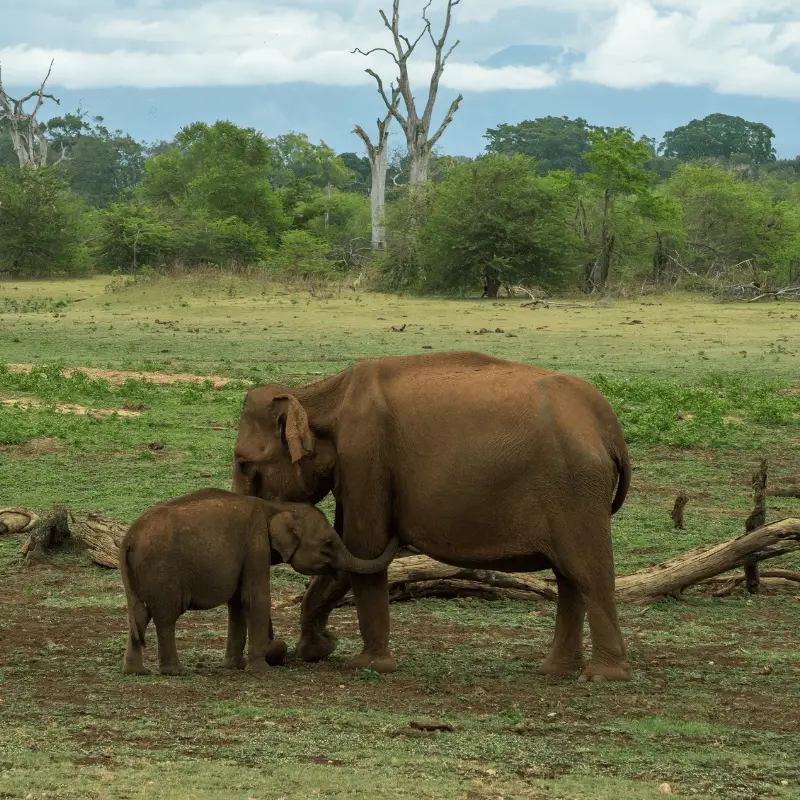
Calves Stages
Just after giving birth, the mothers and other female members of the herd help the calf stand up on its feet.
The newborn calf can stand up independently within half an hour after being born. On average, newborn African elephant babies weigh up to 165 kg. Compared to that, the weight of newborn Asian elephant babies is about 91 kg.
The average weight of a newborn elephant baby is about 120 kg, and its height is about 9 meters.
Once the baby elephant stands on its own feet, the mother and the other female herd elephants guide it to the mother’s breasts to start nursing immediately.
As the trunk of the baby elephants is not that long, the newborns often use their mouths for nursing.
After one or two hours of birth, the calf can start walking independently.
The baby elephants will nurse from their mother for about four years. However, they depend mainly on their mother’s milk for the first six months.
The baby elephants curl up their tongue trunk over their head, allowing them to easily reach for their mother’s milk. The baby elephant grazes on foliage and grass when they are about 2 to 6 months old and occasionally has milk until 4.
Some baby elephants can drink their mother’s milk till they weigh about 800-900 kg.
Elephant milk has high levels of protein and fat, which help the baby elephant to grow faster.
Development
Apart from the mother, the other female herd elephants play an essential role in the life development of the elephant calf. Once the baby elephant is born, the pace of the herd gets adjusted by the matriarch to ensure that the young can keep up.
As they grow old, the baby elephant starts to learn about edible plants and the methods of acquiring them.
Like humans, baby elephants also keenly watch their elders and learn the necessary behaviours. Throughout their childhood, the mother and other female members of the herd stay in constant, affectionate contact with the baby elephant.
They continuously watch over the newborn and offer them assistance and guidance when and as necessary.
On average, baby elephants drink about 10 litres of mothers’ milk daily. When they are about four to six months old, the baby elephants start to experiment with the functions of their trunks. They pick up grass, leaves, and other dietary supplements.
Recommended Read: Eating Habits Of An Elephant
Can an elephant give birth to twins?
Yes. Elephants can give birth to twins, but this is an infrequent phenomenon. Female elephants give birth to babies about 5 to 6 times in their lifetime. Thus, the chances of having twins for a female elephant are scarce. About 1 per cent of all elephant births are twins. The percentage is slightly lower than humans. Compared to elephants, about 1.6 % of humans are twins.
The earliest record shows a Sri Lankan elephant giving birth to twin calves. Another elephant, named Eloise, gave birth to twins when she was 57 years of age. Eloise is the oldest elephant that has given birth to the twins.
Birth Issues Related to Twins
As you can easily imagine, carrying two massive babies is not an easy task. When a mother elephant has twin babies, the total weight of her pregnancy becomes about 100 kgs. That is even lesser than the weight of an individual elephant fetus. That means after the babies are born, they require more milk from their mothers to survive. That makes the life of the elephant mother and the calves difficult.
A single baby elephant consumes about 10 litres of mother’s milk. The mother can find it difficult to produce so much milk to fulfil the requirements of both their calves.
That is why twin elephants tend to mature very slowly. They also stay dependent on their mother’s milk for extended periods.
All these factors make the survival chances of the twin calves even smaller.
Do elephants lie down while giving birth?
No. The female elephants give birth to the young while standing on their four legs. Due to their heavy body weight, standing down on the ground and standing up is one of the most challenging jobs for elephants. With the excessive weight of the babies, it’s almost impossible for the elephants to lie down while giving birth.
Do elephants ever reject their calves?
Elephants are some of the most tactile and friendly animals. That makes the incident, like abandoning their calves, a sporadic affair.
Generally, a pregnant elephant seeks the assistance of another female elephant during the birthing process for protection. After the birth, the mother sniffs the baby and accepts it as its own.
However, there are some cases where the elephant rejects the baby and kills it. Most of the time, such incidents are recorded among captive elephants. However, the reasons for such behaviour of the mother elephants are still unknown.
Can elephants have triplets?
Yes, elephants can have triplets as well. However, the chances of such a birth taking place are scarce. In most cases, baby elephants often die after a couple of days of being born. Even if that does not happen, feeding three babies is almost impossible for the mother elephant. As the mother elephant can’t support the weight of all three babies, the newborn triplets are often born underweight. Unfortunately, the babies do not get enough food and often suffer from malnourishment and die.

